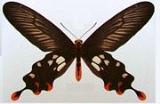
Losaria rhodifer
Encyclopedia
The Andaman Clubtail a rare and beautiful member of the Swallowtail
(Papilionidae) family, is native to India
. The butterfly belongs to the Clubtail subgenus, Losaria, of the genus Atrophaneura
or the Red Bodied Swallowtails.
and restricted to the Andaman Islands
in the Bay of Bengal
.
Swallowtail butterfly
Swallowtail butterflies are large, colorful butterflies that form the family Papilionidae. There are over 550 species, and though the majority are tropical, members of the family are found on all continents except Antarctica...
(Papilionidae) family, is native to India
India
India , officially the Republic of India , is a country in South Asia. It is the seventh-largest country by geographical area, the second-most populous country with over 1.2 billion people, and the most populous democracy in the world...
. The butterfly belongs to the Clubtail subgenus, Losaria, of the genus Atrophaneura
Atrophaneura
Atrophaneura, commonly referred to as the Red-bodied Swallowtails is a genus of butterflies in the Swallowtail family that are generally found in Asia.-Species:Listed alphabetically within groups:The latreillei species-group:...
or the Red Bodied Swallowtails.
Distribution
The butterfly is endemicEndemic (ecology)
Endemism is the ecological state of being unique to a defined geographic location, such as an island, nation or other defined zone, or habitat type; organisms that are indigenous to a place are not endemic to it if they are also found elsewhere. For example, all species of lemur are endemic to the...
and restricted to the Andaman Islands
Andaman Islands
The Andaman Islands are a group of Indian Ocean archipelagic islands in the Bay of Bengal between India to the west, and Burma , to the north and east...
in the Bay of Bengal
Bay of Bengal
The Bay of Bengal , the largest bay in the world, forms the northeastern part of the Indian Ocean. It resembles a triangle in shape, and is bordered mostly by the Eastern Coast of India, southern coast of Bangladesh and Sri Lanka to the west and Burma and the Andaman and Nicobar Islands to the...
.
Description
Male differs from Atrophaneura coon as follows:—Ground-colour a rich velvety-black, much darker than in doubledayi; on the fore wing the pale streaks extend only into the apex of the cell. On the hind wing the medial white markings are much shorter, the spots at base of interspaces 4 and 5 and generally the spot in interspace 7 absent; the subterminal and terminal vermilion spots are much larger, and the tail is vermilion on its apical spatulate portion. Antennae, head, thorax and abdomen as in doubledayi, but the head entirely vermilion-red. Female closely resembles the male, fore wing broader, red markings on hind wing more crimson than vermilion-red, often dull and irrorated slightly with black scales; medial white markings more extensive, the white mark in interspace 1 extends well below vein 1.Status
It has been described as not rare but much work needs to be done to clarify its exact status and distribution. It is not listed as threatened.See also
- LepidopteraLepidopteraLepidoptera is a large order of insects that includes moths and butterflies . It is one of the most widespread and widely recognizable insect orders in the world, encompassing moths and the three superfamilies of butterflies, skipper butterflies, and moth-butterflies...
- Butterflies
- Papilionidae
- List of butterflies of India
- List of butterflies of India (Papilionidae)

